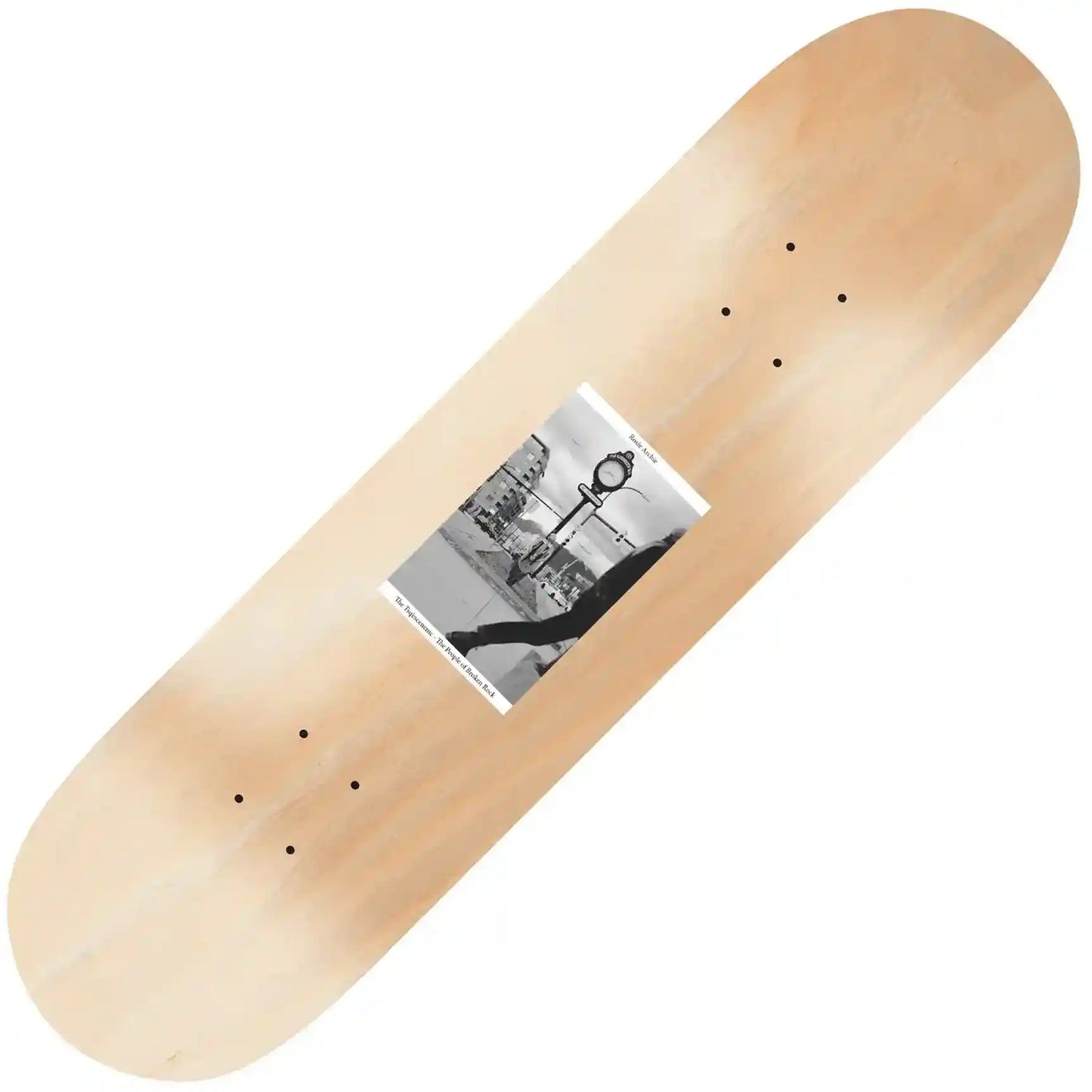Colonialism Rose Archie MMIWG2S Deck (8.0")
Colonialism Rose Archie MMIWG2S Deck (8.0")
Couldn't load pickup availability
For the next graphic, Colonialism celebrates an Indigenous woman in the skateboard community on Turtle Island and a team rider for Colonialism. Rosie Archie is from Tsq'escen' (Canim Lake) of the Secwepemc (Shuswap) Nation. Tsq’escenemc means “The People of Broken Rock” and they are part of the lakes people of the Northern Shuswap. Rosie’s traditional language that she learned growing up is Secwepemcstin, known as the Shuswap language. Rosie has been skating for years and is known for incorporating and celebrating her culture through skateboarding.
The skateboard graphic features a photo taken by Taylor Ross-Robinson of Rosie in a dress originally made for her late sister, Tracy, by their mother, Mary Anne Archie, in the late 1980s. This design honors Mary Anne's craftsmanship and the family’s history. The beadwork on the skateboard, created by Cole Chalifoux from Grouard, Alberta, in Treaty 6 Territory, highlights a long-standing cultural tradition. Cole’s beading is more than art; it’s a revival of her people’s heritage. Otter fur, used in the design, has been valued for its protective and insulating properties and symbolizes strength. Rosie has been a major inspiration for Cole, encouraging her to continue her cultural practices. Through Rosie’s leadership and influence, Cole has been motivated to honor her traditions. Cole is proud to create beadwork for Rosie, acknowledging her as a vital role model and leader for their community, Kinanâskomitin!
The red-painted hand on the face represents MMIWG2S, which stands for Missing and Murdered Indigenous Women, Girls, and Two-Spirit people. It’s a symbol of the ongoing fight for justice and awareness for these individuals. The issue of Missing and Murdered Indigenous Women and Girls (MMIWG) and Two-Spirits in North America, particularly in Canada, is a profound and urgent crisis that reflects systemic racism, colonialism, and socioeconomic disparities. Indigenous women, girls, and Two-Spirit individuals face disproportionately high rates of violence, with many cases going unsolved or underreported. This epidemic is rooted in a long history of marginalization and exploitation of Indigenous communities, where centuries of colonization have eroded cultural ties, economic stability, and social cohesion. The lack of adequate legal protection and the persistent stereotype about Indigenous people further worsens the issue.
In Canada, the crisis of MMIWG has prompted a national outcry and calls for justice, leading to significant governmental and societal responses. The National Inquiry into Missing and Murdered Indigenous Women and Girls, concluded in 2019, highlighted the systemic nature of the violence and called for sweeping changes across policing, justice, and social services. Despite these efforts, progress has been slow, with many Indigenous families still struggling with unresolved cases and a justice system that often fails to address their needs adequately. Grassroots organizations and advocates continue to push for more thorough action and accountability, highlighting the need for culturally informed policies and greater support for Indigenous-led programs.
Addressing the crisis of MMIWG and Two-Spirits requires a holistic approach that not only seeks to bring justice to victims but also aims to dismantle the underlying factors contributing to the MMIWG2ST crisis. This involves confronting the legacy of colonialism, investing in community-led solutions, and creating systemic changes within legal, political, and social systems. The path forward must be guided by respect, justice, and a commitment to upholding the rights and dignity of all Indigenous individuals.
Resources
https://www.mmiwg-ffada.ca/final-report/
https://nafc.ca/policy/mmiwg2s?lang=en
https://pauktuutit.ca/mmiwg-inuit-action-plan/
https://nwac.ca/assets-knowledge-centre/NWAC-action-plan-English.pdf
Colonialism Rose Archie MMIWG2S Deck (8.5"). Stain Colour may vary. Grip not included, but can be purchased in our grip and hardware section.
Imported.
Michael Langan is an Indigenous artist from Cote First Nation, Treaty 4 Territory, who is committed to educating people through creative renderings of our colonial past. After moving to Regina almost 20 years ago, Micheal immersed himself in the local skateboard community, of which he has remained a prominent member ever since. Last spring, Micheal launched his own skateboard company – Colonialism Skateboards – to draw attention to, and have people engage with, complex and untelling aspects of Indigenous Canadian history and culture. By combining skateboard art with a history lesson on Indigenous culture and colonialism in Canada, Micheal’s innovative approach is leading a conversation about how Canadians, especially youth, can move forward together through reconciliation.
Profoundly influenced by his upbringing and experiences as an inter-generational residential school survivor, Micheal’s initiative has grown and expanded beyond the realm of skateboarding. He has been invited to elementary and high school classrooms in Regina, Fort Qu’Appelle, as well as various community panels to speak about his company and its mandate. He was recently invited to the Winnipeg Art Gallery to speak on an Indigenous artist panel, where his boards were featured.
Colonialism Skateboards continues to receive international attention as Micheal inspires skateboarders and non-skateboarders alike to learn about the history and enduring legacy of colonization, and to think about ways to address these ongoing challenges locally and globally.
Colonialism has produced several pro boards for Joe Buffalo as well as a guest board with Dustin Henry.
Micheal has been a long time member of the Tiki Room family.
SKU:CLNLSM2024.10
Share




